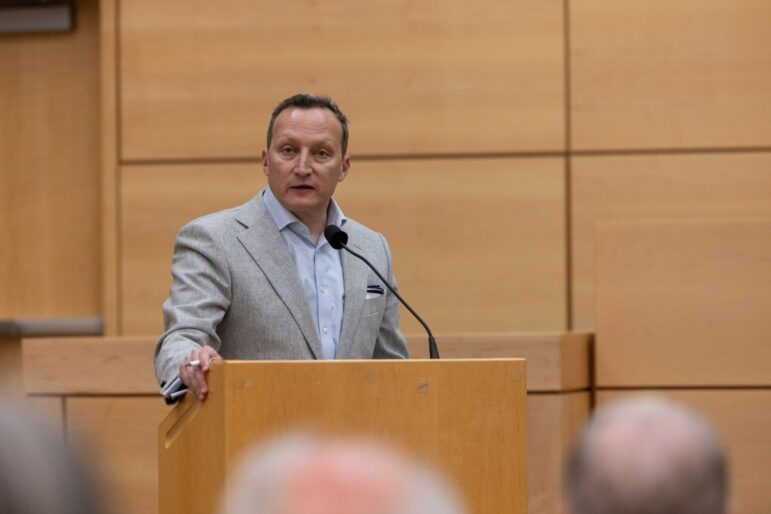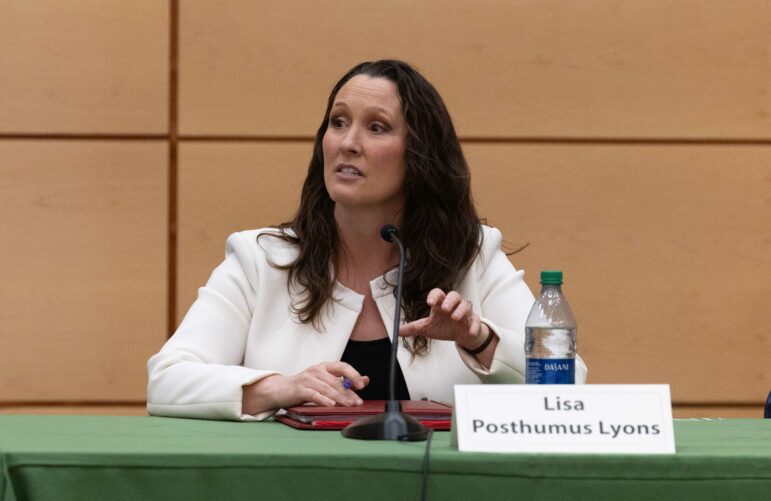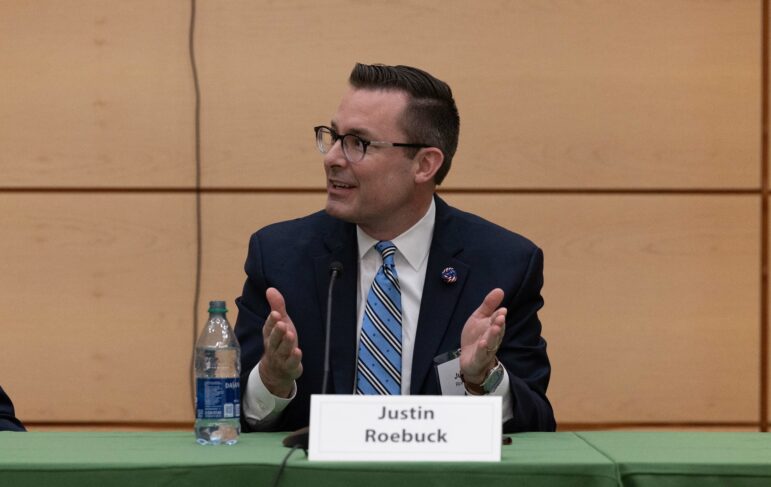
United Photo Works/ American Bar Association
David Becker is a co-founder of the Center for Election Innovation and Research.By OWEN MCCARTHY
Capital News Service
DETROIT — Eight months ahead of a presidential rematch with Michigan set to be a key battleground state, state election officials say their goal is to strike a balance between easy voter access and election security.
And those things aren’t mutually exclusive, they say, given that the country’s processes for vote counting and verification are stronger than ever before – despite distrust sown in some Americans about those processes.
David Becker, the co-founder of the Center for Election Innovation & Research, based in Washington D.C., said one positive trend in election security is the increased use of paper ballots since the 2016 election.
“We have more auditable, verifiable paper ballots than we’ve ever had in American history,” he said during an event hosted by the American Bar Association at Wayne State University Law School to discuss public trust in elections.
Today, 95% of votes are cast on paper ballots, and the only states that still allow non-paper-ballot-voting are non-battleground states, Becker said. That’s an increase from 2016, when about 75% of votes were cast on paper ballots, he said.
Given the reliability of the vote counting processes, election officials said voter accessibility should be welcomed.
“Some people think it’s a problem that Michigan’s voter registration file is over 90%, but I think that’s a great accomplishment,” said former state elections Director Chris Thomas, referring to the proportion of eligible voters that are registered.
He said Michigan has long been a leader in voting accessibility.
For example, he said, in 1975 Michigan became the first state to pass a law allowing citizens to register to vote at motor vehicle registration offices.
The federal government followed suit in 1993, requiring states to offer registration at motor vehicle registration offices.
Ottawa County Clerk Justin Roebuck said same-day voter registration is a more recent example of voter accessibility that doesn’t sacrifice any of the security or verifiability of the process.
Same-day registration was passed through a ballot initiative in 2018.
“That’s a live connected, secure database where a voter is coming in, having to run multiple forms of ID to prove who they are, before they are allowed on the system,” Roebuck said.
Becker commended poll workers, saying the certification of the 2020 election despite obstacles like the COVID-19 pandemic and intense political upheaval demonstrates their dedication to election integrity. That should give people faith in the individuals in charge of the vote counting process, he said.
“They were risking illness for themselves, their staff and their families and somehow, they made it work,” he said. “And that election has withstood the most extreme scrutiny that anyone has ever placed on any election.”
Election officials were heavily berated by skeptics of the 2020 election’s integrity after videos of partially obscured windows at the TCF Center, a polling site in Detroit, circulated on social media.
Claims that election fraud was occurring at that polling site were fact-checked and proven false by news outlets.
“There was a lot of nonsense passed around,” Thomas said. “Yes, they did put cardboard up on the windows because people were banging on single-pane glass.”
Kent County Clerk Lisa Posthumus Lyons, a former GOP state representative, said a “perfect storm” led to the chaos that night.
Large numbers of Republicans were urged by social media accounts to show up to the polling site and serve as poll challengers — despite not having the proper training or credentials. They were at odds with election workers trying to maintain social distance, she said.
“I’m hopeful that because these things aren’t going to be in place, we will restore order in that process,” Lyons said.
Deputy Secretary of State Aghogho Edevbie said conservative organizations’ mobilization of Republicans that night was a “purposeful decision to try and destabilize our democracy.”
“I think it’s important to remember that aspect as we face what is going to be a very critical presidential election this November because it’s going to happen again,” he said. “We just have to keep our eyes open.”
Thomas added that “there was never any chaos in tabulation and counting the ballots.” Instead, “chaos was from those who came in,” referring to non-credentialed Republicans who showed up to serve as poll challengers after claims of fraud spread online.
Roebuck said although skepticism about the accuracy and fairness of the election process proved to be unfounded, election officials have a critical role to play in restoring public trust.
“It’s really important as an election administrator, not to say ‘Woe is me,’” he said. “Sometimes we are being bombarded by all sides, but we do have a role in ensuring public confidence in the process.”
Roebuck said transparency in the process is key to ensuring public confidence.
A 2022 constitutional amendment requiring that post-election audits be conducted in public was a step in the right direction, he said.
Lyons echoed the importance of transparency and added that each voting precinct is legally required to test election equipment to ensure it works correctly.
“We test all of our equipment before every election to make sure it’s functioning properly,” she said. “And that’s open to the public.”

United Photo Works/ American Bar Association
Kent County Clerk Lisa Posthumus Lyons.
United Photo Works/ American Bar Association
Ottawa County Clerk Justin Roebuck